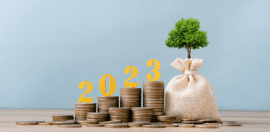Why capital can't be a coward: A disruptive take on impact

13 November 2019 at 5:10 pm
The most disruptive thing about the Impact Revolution is that it calls for a wholesale re-examination of our core beliefs, principles and values, write Mehrdad Baghai, Sean Hinton, Jacqueline Novogratz, Alejandro Preusche and Shane Tedjarati in an open letter to the participants of the GSG Impact Summit in Buenos Aires in November 2019.
The impact investment movement is a growing force in the modern world. Far from a small experiment on the peripheries of the financial sector and the world of philanthropy, impact capital is now a well-recognised and established field unto itself.
There is an increasing admission by true believers and dispassionate observers alike that orthodox assumptions about the laws of investment and markets have been not only challenged, but also superseded. New, exciting and disruptive models (eg the circular economy, outcome-based financial instruments, worker-owned enterprises, living-wage supply chains) are reshaping our understanding of demand, supply and intermediation of impact capital – and they are rapidly broadening to challenge the role of business in society and fostering innovations in the performance of the public sector.
In short, new impact models are beginning to make visible the idea that improving the lot of all stakeholders, not just maximising value for shareholders, should be the central function of capital.
Yet perhaps the most disruptive part of this revolution is the powerful hidden disruption in our core beliefs, principles and values, that this shift implies. We cannot avoid the reality that there is an inherent moral dimension to the generation, distribution and utilisation of wealth and resources. Faced by crises of the magnitude of the climate emergency and the scale of economic inequality, and in deciding how we should deploy one of humanity’s most powerful tools, it seems wrong that we are only asking questions about cost and benefit, risk and return, measurement and metrics, and calling on the generosity and patronage of those with money and power to do a little bit better.
All great social revolutions that have righted great wrongs have been successful because they harnessed powerful moral arguments as part of their program for change. Slavery was morally wrong. Women’s suffrage was morally right. We will know the real Impact Revolution has begun when we have the confidence to assert that investing sustainably and justly in ways that serve people and planet is morally and ethically the only right thing to do, not just an appeal to enlightened self-interest.
“All great social revolutions that have righted great wrongs have been successful because they harnessed powerful moral arguments as part of their program for change.”
We know that old habits die hard, and the old arguments won’t give up without a fight. Even though the mechanics of impact capital are increasingly well-defined and articulated, many traditional investors still claim that it is all too new and untested. Despite the growing plethora of systems of impact measurement and metrics, many claim that without a single agreed methodology no progress can be made. Some mainstream investors suggest that there are no trade-offs required, and that all good investing can result in impact – that we can have our cake and eat it. Others charge that impact investing is simply a smokescreen for mediocre investing.
On the other hand, a new generation is looking to impact investing as the way to invest. They are asking whether we need to call fair and sustainable investments “impact investments”, or just… “investments”. After all we already have a word for a financial transaction in which one side with power profits to the exclusion of the other side without it – it is called theft.
“We already have a word for a financial transaction in which one side with power profits to the exclusion of the other side without it – it is called theft.”
At stake is whether this will indeed, be an Impact Revolution that marks a fundamental shift in our beliefs, principles and values and translates into increased economic justice, or simply an Impact Opportunity, the next in a long line of new asset classes designed to meet market demand and sustain the status quo, that gets captured and productised. The reality is that right now it is both, and it means different things to different people. But the time has come to give explicit voice to the core beliefs that could, and we believe do, underlie a true Impact Revolution.
Here are four proposed ideas to get the conversation going:
- Equality of humanity. First and foremost, the Impact Revolution is based on a firm belief in the fundamental equality of all human beings. The unequal shape of these distribution curves of wealth, income and access is a reflection of a function of new technologies and platforms that provide significant advantages to those with capital and knowledge. Where you were born dictates what your life will be. This is injustice. Beginning with an unshakable belief in the equality of humanity marks a pivotal shift from orthodox investment thinking because it inevitably leads to an inescapable responsibility on the part of those who are fortunate and privileged to act to address these inequities. In truth, impact capital is founded upon a commitment to do our utmost to lift up the condition of those disadvantaged by the lottery of life, because it is our responsibility to do just that.
- Social justice. Second, despite this fundamental responsibility on the part of impact investors, the Impact Revolution is not about their own greatness or benevolence. Far from embodying some modern form of noblesse oblige, this revolution is primarily about the realisation of social justice by enabling the full potential of the whole human race to be unleashed. As some have made clear, development is not something one group of people carries out for the benefit of another group of people. Agency is key. The underlying objective of impact capital must be to accelerate those socio-economic, cultural, environmental, and even political, forces that will empower and enable all human beings to flourish, to make its full contribution to the advancement of our civilisation. But the Impact Revolution is about neither charity nor benevolence; it is about fairness and the enrichment of the masses who have thus far been deprived of their fair share of access to opportunity. These are goals that the private sector, together in partnership with the public sector, have historically embraced to some extent, but clearly, both have proven incapable of achieving in the face of unbridled market forces and entrenched vested interests. The structure and momentum of the market attracts even more wealth for the already wealthy, too often disempowers the poor and exacerbates inequality.
- Mutual interdependence. Third, the evidence of our mutual and collective interdependence on our shared planet is now overwhelming. The world’s collective life suffers when any one group pursues its well-being at the expense of others. Climate change could result in the end of all of our efforts and we know it will have disproportionate impact on the poor, but whether viewed from an environmental, military, social, political or economic perspective, the welfare of the part lies in the welfare of the whole. The extreme and growing gap between the haves and have-nots is neither acceptable nor sustainable as many admired voices, from Nobel laureate economists to leaders of major hedge-funds, have begun to argue. That gap is in fact already a key source of instability for all. There is no long-term justification for preserving the structures and systems that fail to serve the collective interest of all humanity. Impact capital is an attempt to address these failings of market fundamentalism while there is yet time. Simply put, the Impact Revolution serves the interest of all humanity and refuses to allow capital to be deployed in ways that divide society for economic or political advantage.
- Personal transformation. Finally, there is a personal dimension for those who participate in the investment of impact capital. Impact investing calls on us to challenge our beliefs and then act in ways that are coherent with them. It requires a privileged segment of society to become proximate to the reality of life for billions of individuals. This presents a valuable opportunity around personal transformation and the search for meaning and purpose in life. The transformation process starts by putting ourselves onto the other person’s shoes. This is not about “giving back”; it is about “doing right”. It is about solving problems not only for our generation but for those to come. Experiencing the meaning and delight that service provides can help to debunk the myth that one’s worth is measured in terms of accumulation of wealth and consumption of goods. Viewed in this light, being part of the Impact Revolution becomes a worthwhile experience that provides deeper meaning to our lives and personal growth.
The urgency with which these issues are changing and shaping our world signals the dawn of a new world order. But we must remember that we represent a broad church in terms of economic, political and philosophical doctrine. We must be honest in acknowledging where our doctrines have failed some of us in the real world, admitting where our actions have caused harm, and ensure that we do not sacrifice impact for the sake of protecting some outworn creed. In this way, the Impact Revolution is owned by neither the right nor the left of politics; neither the market and capitalism nor the state and socialism. There is no time left for capital to remain a “coward”, it must now become a means for the advancement of equality, justice and human dignity without attachment to political doctrine or dogma.
“There is no time left for capital to remain a ‘coward’, it must now become a means for the advancement of equality, justice and human dignity without attachment to political doctrine or dogma.”
The time has come to give explicit voice to the beliefs, principles and values that are shaping the Impact Revolution. This shared ethic can articulate the underlying purpose of this movement and define the character of its proponents. In this light, the Impact Revolution is not merely a reboot of capitalism into a more benevolent form. It is fueled by an entirely different philosophy and value set that is more conducive to the advancement of human civilisation.
The authors of this article will be speaking at the annual Summit of the Global Steering Group on Impact Investing, taking place in Buenos Aires, Argentina from 18 to 19 November. More details on the Summit can be found here: https://gsgii.org/summit/
About the authors: Mehrdad Baghai is chairman of Alchemy Growth, a boutique strategy and venture firm, and co-founder of High Resolves, a social venture focused on citizenship education, for which he was awarded the McNulty Prize at the Aspen Institute and recognised as a Social Entrepreneur of the Year for 2019 by the Schwab Foundation.
Sean Hinton is the co-director of the Economic Justice Program at the Open Society Foundations and CEO of the Soros Economic Development Fund where he leads the impact investment work for George Soros’s philanthropies around the world.
Jacqueline Novogratz is founder/CEO of Acumen, an organisation dedicated to changing the way the world tackles poverty which has invested more than $120 million in philanthropic-backed capital to build sustainable companies that have served more than 250 million low-income people.
Alejandro Preusche, a former senior partner at McKinsey & Company and a member of the Commission for Peace and Justice of the Assembly of Bishops in Argentina, is developing businesses with impact on poverty reduction.
Shane Tedjarati is president and CEO of Honeywell’s International Operations and founder of Aspen Institute’s China and Middle East Leadership Initiatives.
This story was originally published in Pioneers Post, the global social enterprise magazine.








